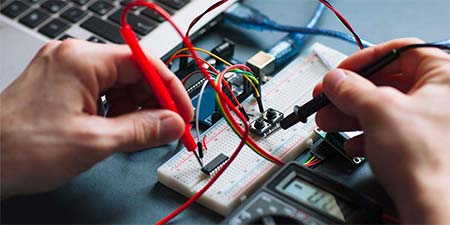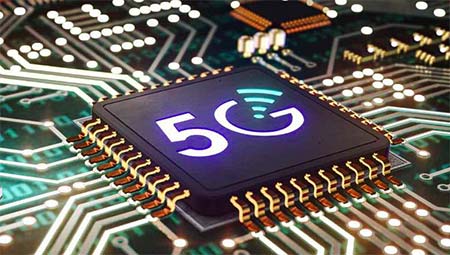Introduction to Electronics Discipline
Electronics is the branch of science that deals with the study of flow and control of electrons and the study of their behaviour and effects in vacuums, gases and semiconductors of electrons and electronic devices. Electronics is the combination of physics, engineering, technology and applications that deal with the emission flow and control of electrons in vacuum and other mediums.
Electronics is widely used in information processing, telecommunication and signal processing. The ability of electronic devices to act as switches that makes digital information-processing possible, interconnection technologies such as circuit boards, electronics packaging technology and other various forms of communication. Electronics play an important role in many pieces of household components. The basic electronics comprises minimal “electronics equipment” and it deals with the effects of electrons in day to day life. The electronics also deals with the study of resistors, transistors, capacitors, diodes, inductors and transformers.
Few lines about M.Sc Electronics
M.Sc Electronics is a 2-year post graduate course that is divided into 4 semesters. The M.Sc Electronics course aims to build problem-solving abilities, management skills and the expertise in designing and operation of electronics among the enrolled students. The course also offers candidates an opportunity to specialise in the current and emerging areas of electronics, computer science and telecommunications. The course gives an extensive knowledge of semiconductor devices that controls the electron flow in devices for the students. The course also deals with study of various components such as vacuum tubes, transistors, diodes and integrated circuits, etc.
Eligibility for M.Sc Electronics
- The students from science background who have studied any 3 as core subjects from physics, chemistry, mathematics, computer science, statistics, electronics in their PUC or 10+2 from recognised board
- The students who have studied their bachelors in science stream with Physics/mathematics/statistics/computer science/electronics as specialisations from recognised university
- The students who have studied BE/B.Tech in Computer Science/Electronics & Communication/Electricals & Electronics are also eligible to apply for M.Sc Electronics
Admission Procedure
The students can take admission to M.Sc Electronics via two modes:
1. Merit Admissions
2. Direct Admission
Let’s discuss in detail
1. Merit Admissions
As the name itself indicates that this admission is based on merit. There are some reputed institutes that conduct entrance exams for M.Sc Electronics courses. The main idea of entrance exams is to select the serious and deserving candidates from a flock of non-serious candidates. The students who clear these entrance exams will be offered merit seats and selection for the same is carried out in the colleges. The fees for merit seats is usually nominal and fixed by the government.
2. Direct Admission
The next method is called the Direct Admission method. Under this method the students can directly get the admissions under management quota for the course without any entrance exams. The students of direct admissions have specialised privileges and they are exempted from appearing to any entrance exams. The advantage of this process is that students will have the option to choose their desired colleges and get confirmed admissions. They can do this even before the starting of the academic year. The students who are interested to take direct admissions can contact the educational counselling centres like Galaxy Educational Services and get their seats booked in their desired colleges.
Course Curriculum for M.Sc Electronics
The students of M.Sc Electronics will be studying the following subjects in their course duration:
- Solid State Electronics Devices
- Digital Electronics
- Analog Circuits
- Network Analysis
- Computer Programming
- Digital Signal Processing
- Electronic Measurement and Instrumentation
- VLSI Design
- Data Structures & Object-Oriented Programming
- Fibre Optics and Communication
- Microwave Electronics
- Microprocessors and Microcontroller Applications
- Analog & Digital Communication
- Control Systems
- Data Communication & Network
- Distributed Computing
- VHDL based System Design
- Circuit Simulation
- Communication Electronics
- Real-time Systems
- Mobile Computing
- Soft-Computing
Future Career Scope
The M.Sc Electronics is one of the most prestigious courses worldwide. It is in great demand among the students of India as well as abroad. The students after the completion of M.Sc Electronics can join a PhD programme to take up research in the field of electronics. They can even join the M.Phil programme to have an in-depth understanding of the electronics discipline. They can join as professors to take up teaching electronics in colleges and universities. They can join many electronic companies and start their career in the field of electronics.
Job Roles
There are certain job roles available for M.Sc Electronics students, they are:
- Instrumentation Engineer
- Technical Director
- Field Test Engineer
- Network Planning Manager
- Customer Support Engineer
- Electronics and Communication Consultant
Top MNCs hiring M.Sc Electronics
Some of the top and important recruiting firms hiring M.Sc Electronics students are:
- Intel
- Philips
- Mistral
- Ample Communications
- Ibex
- Spa Computers
- Cueflux Technologies
- EmLabs
- eSpark Infotech
- IBM
- HCL
- HP
Final Words
M.Sc Electronics is one of the most prestigious courses that is popular among the students of India and abroad. The demand for skilled electronic professionals has been increasing day by day. Many new sophisticated instruments are being developed and manufactured by various companies. The trend has seen a change where many software companies are also focusing on manufacturing electronic items to meet the demands of people. In olden days M.Sc Electronics students were only limited to computer hardware companies, but today they are also hired in many software companies, as they have also started to manufacture hardware components. So, the demand for M.Sc Electronics students are available in both hardware and software companies.
The students who are passionate about the electronic devices and semiconductor devices can join the M.Sc Electronics course and get hired in well-paying jobs in top organisations.





